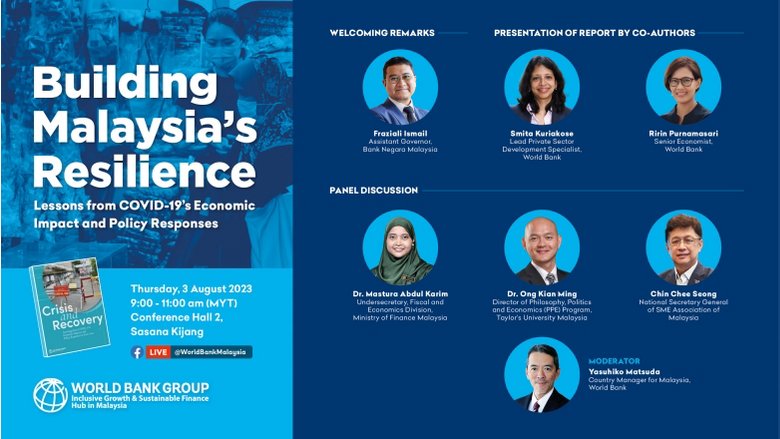More than three years after the first COVID-19 case was discovered, this World Bank report examines the economic consequences and government responses to the COVID-19 pandemic in six East Asian economies: Cambodia, Indonesia, Malaysia, Mongolia, the Philippines, and Vietnam. These countries, while geographically close to each other, experienced the crisis differently and implemented various measures to contain the spread of the virus and mitigate economic impacts with varying success.
Key Messages:
- Building Resilience for Future Crises: The COVID-19 pandemic significantly impacted employment and household income, highlighting the need to enhance resilience for future crises. It is crucial to strengthen the capacity to manage and mitigate the effects of future shocks, ensuring a more robust and adaptive labor market.
- Promoting Equitable Recovery: Targeted interventions are crucial for equitable recovery, focusing on vulnerable groups and narrowing inequalities, supporting small businesses, and providing skills development opportunities for workers.
- Embracing Technological Advancements: The crisis boosted digital technology adoption, highlighting its potential for driving productivity and innovation. Governments and businesses should invest in digital infrastructure and remote work capabilities to enhance resilience and efficiency during future crises.
- Strengthening Social Safety Nets: The pandemic emphasized the importance of social safety nets in providing crucial support during crises. Governments should focus on strengthening and streamlining social assistance programs to ensure broader coverage and better responsiveness to shocks, especially for low-income and vulnerable households.
- Enhancing Policy Effectiveness: Policy measures need ongoing evaluation and refinement to improve their effectiveness in preserving employment, supporting businesses, and reaching those in need. Investing in data collection and monitoring systems is crucial as it enables evidence-based decision-making and allows policymakers to respond quickly and effectively to future crises.
Amidst the pandemic's challenges, Malaysia emerges as a country with notable resilience and potential for recovery, leading the way among the surveyed countries. Here are key findings that highlight Malaysia's experience and its position compared to other countries:
- Economic stability and growth were tested: Malaysia's economy was stable and growing pre-pandemic, with a 5% annual growth rate. It was the wealthiest among the six surveyed countries. Malaysia's low government debt levels allowed effective measures to mitigate the pandemic's impact while ensuring long-term debt sustainability. Despite progress, Malaysia still faces challenges in reducing poverty and inequality, with the Gini index remaining relatively high for an aspiring high-income country.
- Diversified Exports and Trade: Malaysia's diversified exports and strong trade sector contributed to its economic resilience during the pandemic-induced recession. However, the heavy reliance on tourism and trade sectors posed challenges due to the pandemic's restrictions on travel and disruptions in global trade.
- Social protection systems delivered, addressing but exposing gaps: Government assistance programs were deployed rapidly and reached intended beneficiaries, but better targeting and consolidation of support instruments are needed. Programs could prioritize vulnerable groups, broaden eligibility, and provide temporary coverage for households experiencing economic shocks. Consolidation of social assistance programs can enhance range and protection for low-income and vulnerable families, promoting equitable recovery.
- Resilient Business Environment: Malaysia's favorable business environment, ranked highest among the six countries studied according to the World Economic Forum's Global Competitiveness Index, enabled Malaysian firms to effectively navigate disruptions caused by the pandemic and capitalize on opportunities during the recovery. Government support to firms could be reviewed and redirected towards programs that improve long-term growth potential. Policy instruments should prioritize the self-selection of productive firms and investments in technology adoption and innovation.
- Enhancing labor market policies and expanding coverage for informal workers is crucial: The labor market quickly adjusted to shocks during the crisis with government interventions promoting job creation and adaptation to new opportunities. However, Malaysia's labor programs are relatively underdeveloped, with limited accessibility for workers in the informal sector. Integration of programs across ministries and agencies and increased shock responsiveness can strengthen labor market policies. Hiring incentives should be balanced with well-designed training programs to address skills mismatches.
The experience of the COVID-19 pandemic provides valuable lessons for building resilience and managing future crises. Governments should prioritize equitable recovery, leveraging technological advancements, and strengthening social safety nets to protect vulnerable groups.
Continually evaluating and improving policies and investments in data-driven decision-making will be crucial in effectively navigating future challenges and ensuring a more resilient and inclusive labor market.
